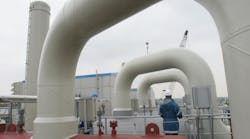Eric Watkins
Senior Correspondent
LOS ANGELES, June 3 -- Brazil's Petroleo Brasileiro SA (Petrobras), in an effort to reduce its dependence on imports from neighboring Bolivia, has announced the signing of two contracts for the purchase of LNG from Britain's BG Group PLC.
"This is one more step toward setting up infrastructure to guarantee greater flexibility in the Brazilian gas market," said Petrobras Pres. Jose Sergio Gabrielli de Azevedo in announcing the agreements.
Analyst Global Insight said the agreements, which mark Brazil's conversion to an importer of LNG, also will give the country more flexibility to meet demand for gas from an electric power network that is predominantly hydroelectric.
Under the agreements, BG will supply the import terminals being built by Petrobras at Pecem in the state of Ceara and at Guanabara Bay in the state of Rio de Janeiro. Initially, Petrobras expects volumes to range 75,000-130,000 cu m/day.
The first agreement will provide the first LNG cargo ever to be delivered into Brazil and it will be used for the commissioning of the Pecem terminal in July. The second agreement will enable LNG to be supplied to either the Pecem or Guanabara terminals in Brazil. Petrobras will define, load-by-load, which terminal the LNG will be delivered to. This will be dependent on the gas demand in the local markets.
Brazil has been looking to buy LNG since Petrobras was forced out of Bolivia in 2006 after President Evo Morales nationalized the country's gas industry.
Petrobras still depends on Bolivia for 60% of the gas it uses, but due to lack of investment, La Paz's nationalized industry has been struggling to satisfy domestic demand growth as well as export commitments to Brazil and Argentina.
In March, reports said Bolivia's gas industry was operating near capacity. With output of less than 42 million cu m/day, Bolivia was hard-pressed to supply domestic demand and meet its contracts of 30 million cu m/day to Brazil and 7 million cu m/day—rising to 27.7 million cu m/day by 2010—to Argentina.
At the time, Carlos Alberto Lopez, a consultant with Cambridge Energy Research Associates and a former Bolivian energy minister, said the Latin American country had been unable to fulfill its commitments since September and that it seemed extremely unlikely for it to meet them in the medium term.
Meanwhile, Companhia de Gas de Santa Catarina June 2 presented its new $1.5 billion reais project to supply natural gas to the south of Brazil by 2012, making use of the existing Brazil-Bolivia gas pipeline between Araucaria and Canoas.
Contact Eric Watkins at [email protected].
